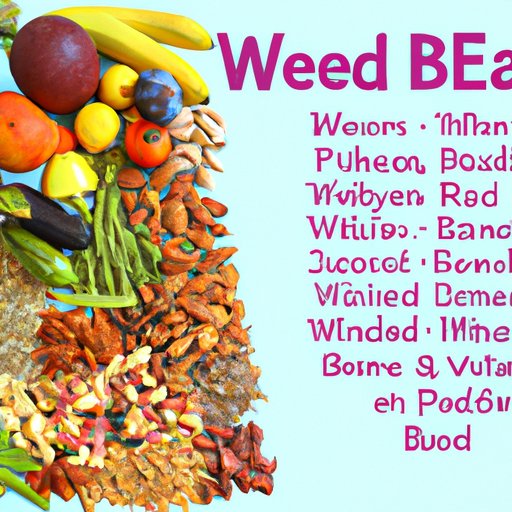Introduction: What is a Whole Food Plant Based Diet?
A whole food plant based diet is a style of eating that focuses on consuming whole foods in their natural form. This means avoiding processed and refined foods, as well as animal products such as meat, dairy, and eggs. Instead, people who follow a whole food plant based diet focus on eating a variety of fruits, vegetables, whole grains, legumes, nuts, and seeds. Plus, they emphasize mindful eating habits and an overall healthy lifestyle.

Benefits of a Whole Food Plant Based Diet
Research has shown that a whole food plant-based diet can have numerous health benefits. Studies have found that following this type of diet can lead to improved heart health, lower cholesterol levels, better blood sugar control, and a lower risk of certain chronic diseases. Additionally, it can be beneficial for the environment, since it reduces the consumption of animal products which tend to have higher environmental impacts than plant-based foods.
An Introduction to Eating Whole Foods for Optimal Health
Nutritional Benefits
Eating a wide variety of whole foods provides the body with essential nutrients, vitamins, minerals, and fiber that are vital for optimal health. According to a study published in The American Journal of Clinical Nutrition, “A whole food, plant-based diet is associated with higher intakes of dietary fiber, magnesium, potassium, vitamin C, vitamin E, folate, carotenoids, flavonoids, and other phytochemicals.”
Environmental Benefits
In addition to the nutritional benefits, following a whole food plant-based diet can also be beneficial for the environment. A study from the University of Oxford found that adopting a plant-based diet could reduce global greenhouse gas emissions by up to 73%. This is because animal agriculture requires more resources and produces more emissions than growing and harvesting plant-based foods.
How to Get Started on a Whole Food Plant Based Diet
Building a Grocery List
The first step to transitioning to a whole food plant-based diet is to build a grocery list. Start by stocking up on fresh produce such as fruits, vegetables, and leafy greens. Also, look for grains like quinoa, oats, and brown rice, as well as legumes like beans, lentils, and chickpeas. Finally, add nuts, seeds, and nut butters for additional protein and healthy fats.
Creating Meal Plans
Once you have your grocery list, the next step is to create meal plans for the week. Start by planning out breakfast, lunch, and dinner for each day. For breakfast, try smoothie bowls topped with fresh fruit, oats cooked with almond milk and chia seeds, or avocado toast with tomatoes and spinach. For lunch, make salads with quinoa, roasted vegetables, and a tahini dressing. And for dinner, try veggie stir-fries, tacos filled with black beans, or roasted sweet potatoes with garbanzo beans and kale.
Finding Recipes
If you’re new to plant-based cooking, it can be helpful to find some recipes to get started. There are many online resources where you can find delicious, healthy, and easy-to-follow recipes. You can also check out cookbooks, magazines, and websites dedicated to plant-based cooking for inspiration.
Tips for Transitioning to a Whole Food Plant Based Diet
Start Small
Transitioning to a whole food plant-based diet can seem overwhelming at first, so it’s important to take it one step at a time. Start by gradually introducing more plant-based meals into your diet and gradually eliminating animal products. This will help you adjust to the new way of eating without feeling overwhelmed.
Find Support
Having a support system can also be helpful when transitioning to a whole food plant-based diet. Connect with friends and family who are already following this type of diet or join online communities to get advice and share recipes. Knowing that you’re not alone in this journey can be motivating and encouraging.
Focus on Variety
Finally, it’s important to focus on variety when following a whole food plant-based diet. Eating a variety of fruits, vegetables, grains, legumes, nuts, and seeds will ensure that you’re getting all the essential nutrients your body needs. Try to incorporate different colors and textures into your meals for a balanced, nutritious diet.

The Essential Elements of a Whole Food Plant Based Diet
Fruits and Vegetables
Fruits and vegetables should be the foundation of any whole food plant-based diet. Aim to eat a variety of both fresh and frozen fruits and vegetables every day. Choose different colors to get a variety of nutrients and flavors.
Whole Grains
Whole grains are an excellent source of fiber, B vitamins, and minerals. Examples of whole grains include quinoa, oats, barley, buckwheat, brown rice, and millet. Try to incorporate a few servings of whole grains into your daily diet.
Legumes
Legumes are a great source of plant-based protein. Examples of legumes include beans (black, kidney, pinto, etc.), lentils, chickpeas, and peas. Incorporate a few servings of legumes into your weekly meal plan for an extra boost of nutrition.
Nuts and Seeds
Nuts and seeds are another great source of plant-based protein and healthy fats. Try adding a handful of nuts or seeds to your morning oatmeal or using nut butter in your smoothies. You can also sprinkle nuts and seeds on salads or use them to make homemade trail mix.

Common Misconceptions About Whole Food Plant Based Diets
Limited Choices
One common misconception about whole food plant-based diets is that there are limited choices. While it’s true that some foods need to be avoided, there are still plenty of delicious and satisfying options to choose from. From smoothies and salads to stir-fries and tacos, the possibilities are endless.
Unsatisfying Meals
Another misconception is that plant-based meals are unsatisfying. However, research shows that following a whole food plant-based diet can actually lead to a greater sense of satisfaction. In a study published in Nutrients, researchers found that participants who followed a vegan diet reported higher levels of satisfaction than those on an omnivorous diet.
Difficult to Follow
Finally, some people believe that a whole food plant-based diet is too difficult to follow. While it may take some time to get used to, with a little bit of practice and patience it can become second nature. Plus, with so many delicious recipes available, it doesn’t have to be boring or complicated.
Conclusion
Following a whole food plant-based diet can be a great way to improve your health and the planet. It involves eating a variety of whole, unprocessed plant-based foods such as fruits, vegetables, whole grains, legumes, nuts, and seeds. With the right meal plans and recipes, anyone can transition to this type of diet and enjoy its many benefits.
(Note: Is this article not meeting your expectations? Do you have knowledge or insights to share? Unlock new opportunities and expand your reach by joining our authors team. Click Registration to join us and share your expertise with our readers.)
